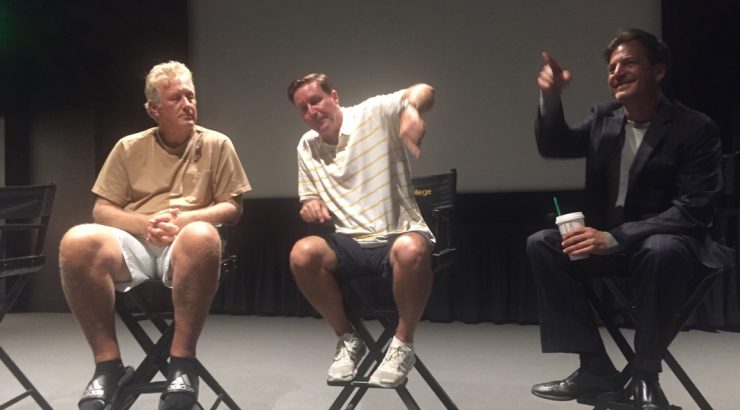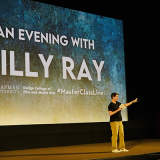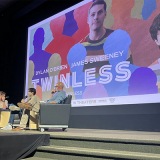
New course ‘Journalism in the 21st Century’ explores the changing landscape of news
October 24, 2016
Vines, memes, tweets, 2 hours of a presidential debate condensed to 90 seconds. The way viewers consume news is consistently challenging traditional journalism methods, including broadcast journalism.
To better prepare students for the unknown, Professor Pete Weitzner created the course Journalism in the 21st century, calling on his connections amassed over thirty years in the business to provide insight and inspiration into navigating journalism in a viral world.
On the roster this past week included Emmy Award-winning sports journalist Jim Watson, who has been covering sports for more than 25 years for networks such as PAC-12, NBC SPORTS, UNIVERSAL SPORTS, TIME WARNER, FOX SPORTS NET, and ESPN3; and Ned Augustenborg, who has produced and directed for network giants including ESPN, CNN, MSNBC, and has managed several local studios. The pair, along with sports announcer Sam Farber, discussed the evolution of news and the nature of the business as it exists today, offering students tips and tricks to navigate the competitive world of sports journalism.
These are their stories. Ding Ding.
Know the news from the ground up…
Watson’s first internship was with KHON, the NBC affiliate in Honolulu, when he was attending the University of Hawaii. As a valet at a local restaurant, he turned down a tip from a news anchor, requesting an internship instead. Despite expressing interest in being a sportscaster, Watson got his start in the news department, where his first story assignment was covering a fuel spill at Honolulu International Airport. “That kind of experience provided me with perspective, and made me more well-rounded,” said Watson.
As an undergrad at George Washington University, Farber had to learn everything from the ground up before being allowed to call a student game. “It’s good to know every aspect of the business, you’ll know what you’re doing that way and prove to your crew that you’re a team player.”
Keep it simple…
“In sports all we do is adlib. You’re given a topic and given a time, and told to fill the time,” said Watson, who learned how to adlib from watching Weitzner when the two worked at Orange County News.
“He (Weitzner) was the best adlibber I have ever seen on television. He would do 8-10 minute segments on business, all by himself, they weren’t only good, they were entertaining.”
Now, Watson only writes bullet points: “know your topic. Don’t memorize a stand up, it’ll sound like it. Write in your own voice using colorful, descriptive language. Get creative and have fun with it.”
Calling off satellite: The future of sportscasting…
Watson has called for four Olympic Games, including this past summer’s which he called off satellite from NBC’s headquarters in Stamford, Connecticut. “This is the future of sports television. I work for the PAC12 NETWORK and probably 20% of the shows are called off satellite. People aren’t even at the arena, they’re in a booth in San Francisco calling it that way. 75% of the sports at the Olympics were not called from Brazil, they were called from Stamford, Connecticut. You probably watched it and didn’t even know.”
Don’t feed the trolls….
“In the world we live in, no matter what you say, or what you write, it has a chance to go viral. Never say anything into a microphone that you don’t want to go out, because eventually it will,” said Watson. “Things can be misinterpreted and people will see things through their own prism. Never feed the trolls.”
Make sure you’re connected…
“It doesn’t matter if you’re behind the camera of in front of it you’re going to need to know how to manage people,” said Augustenborg. “Get to know the people that are supporting you. You can’t do successfully what you’re doing without the help of others.”
“Get to know the other people in this class,” said Watson. You’re going to be in competition with one another and that’s okay, but you’re also going to help one another.
“Make sure people know and remember who you are, so that you’re at the front of their minds when an opportunity comes up,” added Farber.
Show me the money…
There may come a time in your career where you’ll need to, or want to, consider being represented by an agency. Some of us are still waiting for our Jerry Maguire, so in the meantime, Watson offers the following advice for if/when that day comes:
“Don’t walk out of here thinking you need an agent because they’re guardian angles that are going to groom you for the future and make sure you’re taken care of. It’s not going to happen. Also, don’t let anyone tell you 10% is the standard. I pay my guy 5% and only on what he brings in.”
And finally –
At the end of the day, there’s always weather…
“I think weather is the hottest thing in TV right now. It’s no longer a recap of the day’s temperature,” said Watson. “Turn on the Weather Channel – those guys are doing news. There’s real work there.” Watson recounts the story of a young woman who tried to break into the news business with various freelance gigs, moving about the country, until she was offered the chance to do weather. Now? “She’s highly successful and making lots of money.”
Intrigued? Journalism in the 21st Century meets every Monday this semester at 7 p.m. in the Cloobeck Screening Room in the Digital Media Arts Center.

